If you’re raising chickens, you might have encountered a squirming surprise in your coop: maggots. Your immediate question might be, do chickens eat maggots? The answer is a resounding yes. Maggots can be a significant source of protein for your flock.
However, feeding maggots to chickens isn’t quite as straightforward as it seems. It requires a careful balance of knowledge and caution to ensure your chickens’ health and safety.
In this article, we will explore everything you need to know about the role of maggots in a chicken’s diet. From understanding the nutritional needs of chickens, weighing the benefits and potential risks of maggots, and offering practical tips for safe feeding practices. So, let’s jump in and dissect this intriguing aspect of the chicken diet.
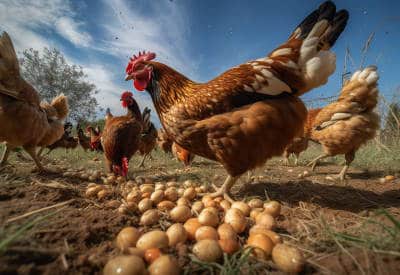
Understanding Chickens’ Dietary Needs
Chickens are fascinating creatures, aren’t they? They’re omnivores, happily munching on a diet ranging from grains and vegetables to a bit of meat. Let’s dive a bit deeper, shall we?
Overview of chickens’ nutritional requirements
A well-rounded diet is key for our feathered friends. They need a balance of carbohydrates, fats, vitamins, minerals, and – you guessed it – protein. This essential nutrient supports their health, growth, and egg production.
The role of protein in chickens’ diet
Protein is like the building block of life for chickens. It’s crucial for their feather production, muscle growth, and overall vitality. Not to mention, it plays a critical role in producing those lovely fresh eggs we all enjoy.
[ChickenAffiliate]
Insects as a Part of Chickens’ Diet
Here’s where it gets interesting. Chickens, in their natural habitat, are bug-hunting machines!
The natural insectivorous behavior of chickens
If you’ve ever spent a sunny afternoon watching your chickens roam around, you’ve seen them scratching and pecking at the ground. That’s not just chicken-style fun, my friends. They’re hunting for insects, a tasty and protein-rich part of their diet.
Common insects in a chicken’s diet
From beetles to worms, it’s probably on the chicken’s menu if it wriggles or crawls. This, naturally, brings us to the wriggly guests of the day: maggots.
Maggots: An Unexpected Source of Protein
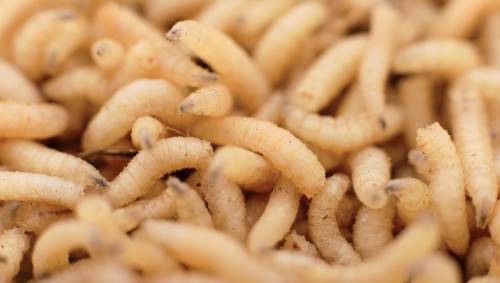
Maggots, the larvae of flies, might not be the first thing you think of when it comes to feeding your chickens. But let’s look a bit closer.
What are maggots and where do they come from?
Maggots are baby flies if you will. They appear in areas where flies have access to decaying organic matter. Not exactly pleasant, but it’s the circle of life.
Nutritional value of maggots
Despite their somewhat icky origin, maggots are protein powerhouses. They’re packed with this essential nutrient, which makes them a potential candidate for our chickens’ menu.
Can Chickens Eat Maggots: The Good and the Bad
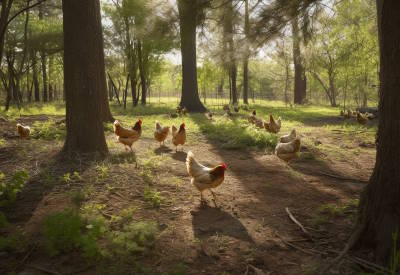
So, we’ve finally arrived at the million-dollar question: Can chickens eat maggots? The short answer is yes, they can. But as with most things in life, there’s more to it than just a simple yes or no.
The Upsides: Nutritional Benefits of Maggots
First, let’s talk about the good stuff. Maggots, believe it or not, are pretty much packed with protein. This makes them an excellent resource, especially for free-ranging chickens that naturally come across these creatures in their environment. Adding maggots to your chickens’ diet can boost their protein, promoting their overall health and well-being.
The Downsides: Risks and Considerations
But let’s not put on rose-colored glasses just yet. There are certain risks and considerations that come with feeding maggots to your chickens. If maggots are found in unsanitary conditions, they can become carriers for diseases and harmful bacteria. If your chickens consume such maggots, they might be at risk of infection.
The Conditions: When Is It Safe to Feed Maggots?
Safety is key when it comes to feeding maggots to your chickens. Ensuring that the maggots are sourced from clean, healthy environments is crucial. If you’re finding maggots in your compost pile or other areas where organic material is breaking down, it’s usually safe to let your chickens have them.
The Bottom Line: Balancing Benefits and Risks
While maggots can be a good protein source for your chickens, it’s important to strike a balance. Always ensure that the maggots are sourced from clean, disease-free environments, and monitor your chickens for any signs of distress or illness after introducing maggots into their diet.
Feeding Maggots to Chickens: Safe Practices
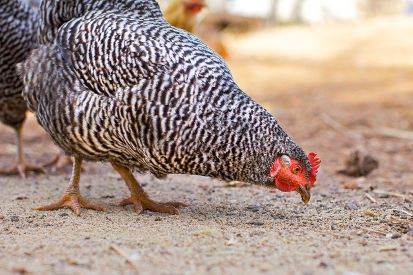
If you’ve decided to introduce maggots into your chickens’ diet, there are a few things you’ll need to consider. The most important factor? Safety, of course. Let’s explore practical strategies to keep your feathered friends happy and healthy.
Sourcing Maggots Safely: Where to Find Them?
First things first, you’ll need to source your maggots. While you might find some in your compost pile or other places where organic matter is breaking down, it’s usually safer to buy them. Many reliable suppliers breed insects for animal feed, and purchasing from them can give you peace of mind that you’re getting clean, disease-free maggots.
The Right Way to Introduce Maggots into the Diet
Change can be hard, even for chickens. When introducing maggots into their diet, do so gradually. This will help you monitor their reaction and ensure they don’t have any adverse effects. Start with a small quantity mixed into their regular food, gradually increasing the proportion if they seem to be taking it well.
Hygiene is King: Keeping Things Clean
The importance of cleanliness cannot be overstated. Always ensure the maggots are clean before you feed them to your chickens. Also, remember to keep the feeding area tidy. If you’re scattering maggots for the chickens to peck at, do so in a clean tray or a specific part of the yard that’s easy to clean up afterward.
Monitoring Your Chickens: An Ounce of Prevention
After you’ve started feeding maggots to your chickens, keep a close eye on them. Look for any changes in their behavior, appetite, or general health. If you notice anything out of the ordinary, it’s best to consult with a vet. Remember, the well-being of your chickens is always the priority!
Other Natural Protein Sources for Chickens
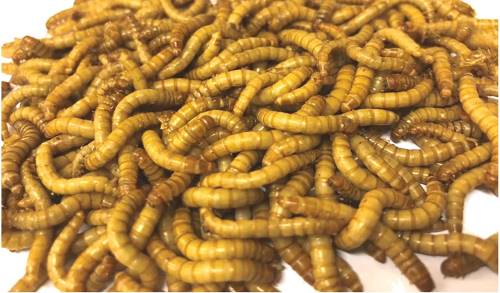
While maggots can be a part of the diet, variety is the spice of life, right?
Identifying and providing alternative protein-rich foods
There are other protein-packed foods to consider. Mealworms, for example, are a hit with most chickens and can be bought from pet stores or online. Earthworms, too, can be a great source of protein. Even common kitchen scraps like meat or fish leftovers (cooked, of course) can provide a protein punch.
The importance of a varied diet for optimal health
A varied diet is essential for your chickens’ overall health. While protein is key, it needs to be balanced with other nutrients. Ensure your chickens have access to good-quality feed covering all their nutritional bases, alongside the extra protein snacks.
Raising Your Own Maggots: A Sustainable Protein Source for Chickens
If you’re interested in providing a steady supply of maggots for your chickens while ensuring they’re clean and disease-free, you can consider raising them yourself. Here’s a brief overview of how to do it.
Choosing the Right Set-Up
To raise your own maggots, you’ll need a suitable container. A plastic storage bin with a tight-fitting lid and some ventilation holes is a good option. You can also use a DIY maggot farm made from stacked buckets with mesh-covered holes to separate the maggots from their food source.
Preparing the Food Source
Maggots are typically raised on a diet of decaying organic matter. You can use a mix of fish, meat scraps, and poultry byproducts to ensure cleanliness and prevent odors. Replace the food source regularly to maintain hygiene and avoid foul smells.
Introducing the Flies
Once your container and food source is ready, you’ll need to introduce some adult flies. You can catch them in your yard or purchase them from a supplier. Maggots will hatch and grow once the flies lay their eggs on the food source.
Harvesting the Maggots
Once the maggots reach a suitable size, usually within a week, you can harvest them to feed your chickens. Simply separate them from the food source and rinse them thoroughly with water to clean them before feeding. Remember to maintain hygiene throughout the process to ensure a healthy, disease-free food source for your flock.
Raising your own maggots can be a cost-effective and sustainable way to provide your chickens with a regular supply of protein-rich food. By following these steps, you can ensure your maggots are clean, safe, and a valuable addition to your chickens’ diet.
What Other Insects Can Chickens Eat Apart from Maggots?
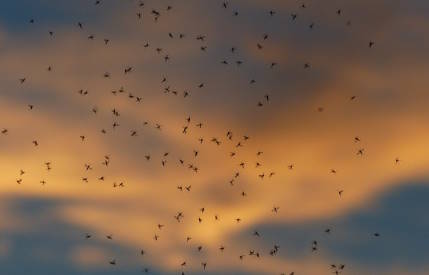
Maggots are just one part of the array of insects chickens can enjoy. These natural bug-hunters are quite the connoisseurs when it comes to insects. Let’s explore other tasty critters that can provide your flock with a healthy, protein-packed snack.
Ticks
Ticks aren’t just annoying for humans; they can also be a nuisance for our pets and livestock. The good news is chickens love to eat them. Having chickens around can significantly reduce the tick population in your yard. Plus, ticks are a good source of protein, making them a nutritious snack for your chickens.
Read More: Do Chickens Eat Ticks? Unveiling Their Role In Pest Control
Mosquitoes
We all know how bothersome mosquitoes can be. But did you know that chickens can help keep their population down? Mosquitoes form part of the natural diet of chickens, providing them with a quick protein snack and helping keep your yard more comfortable for everyone else.
Read More: Do Chickens Eat Mosquitoes? Surprising Benefits Revealed
Fleas
Fleas, like ticks, can be a nuisance to pets and livestock. Chickens, with their keen eyes and quick beaks, are excellent at catching these tiny critters. This not only helps to control flea populations but also provides your chickens with a protein-rich food source.
Read More: Do Chickens Eat Fleas? Your Backyard’s Secret Pest Patrol
Flies
Flies might be annoying to us, but they’re just another tasty morsel to chickens. Chickens will happily snap up any flies within their reach. And when those flies become maggots, we’ve already covered what a protein punch those can pack!
Read More: Do Chickens Eat Flies? Uncovering The Fascinating Truth
Bees
While bees are generally beneficial insects we want to encourage, chickens sometimes eat them. This is more common with ground-dwelling bees or when bees are found in the chickens’ water. Bees can offer a little protein boost, but it’s best not to encourage this too much, as we need bees to help pollinate plants.
Read More: Do Chickens Eat Bees? The Surprising Truth Revealed
Do chickens eat maggots – final thoughts
So we’ve journeyed through the world of chicken diets and landed squarely on the protein-packed question: do chickens eat maggots? The answer, as we’ve discovered, is a hearty yes. Maggots can be a protein-rich addition to your chicken’s diet, provided you source them responsibly and introduce them safely.
In the grand coop of life, it’s clear that maggots can have their place at the chicken dinner table. Just remember, as with any aspect of raising your feathered friends, vigilance and care are key. Whether you’re farming for eggs or simply enjoying the company of these delightful birds, knowing what goes into their diet is an important part of responsible chicken ownership.
Related Articles:
